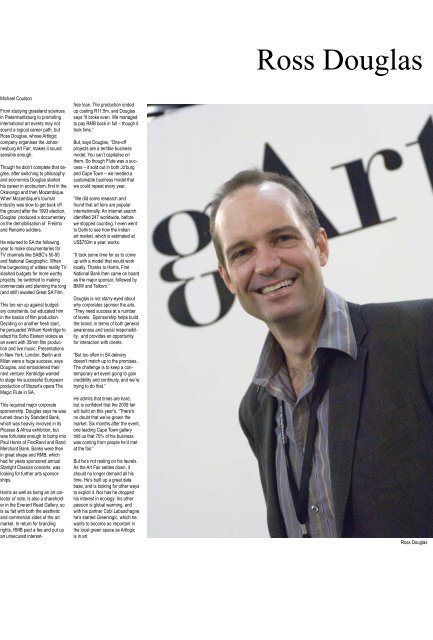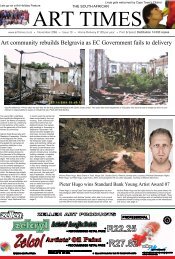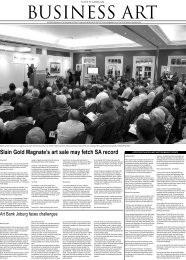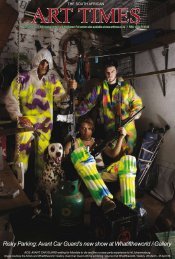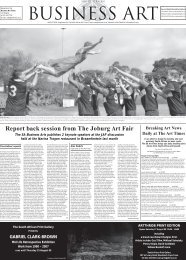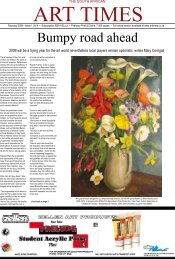Zavick & Ulric's washline fire burns brightly - South African Art Times
Zavick & Ulric's washline fire burns brightly - South African Art Times
Zavick & Ulric's washline fire burns brightly - South African Art Times
You also want an ePaper? Increase the reach of your titles
YUMPU automatically turns print PDFs into web optimized ePapers that Google loves.
Michael Coulson<br />
From studying grassland sciences<br />
in Pietermaritzburg to promoting<br />
international art events may not<br />
sound a logical career path, but<br />
Ross Douglas, whose <strong>Art</strong>logic<br />
company organises the Johannesburg<br />
<strong>Art</strong> Fair, makes it sound<br />
sensible enough.<br />
Though he didn’t complete that degree,<br />
after switching to philosophy<br />
and economics Douglas started<br />
his career in ecotourism, first in the<br />
Okavango and then Mozambique.<br />
When Mozambique’s tourism<br />
industry was slow to get back off<br />
the ground after the 1993 election,<br />
Douglas produced a documentary<br />
on the demobilisation of Frelimo<br />
and Renamo soldiers.<br />
He returned to SA the following<br />
year to make documentaries for<br />
TV channels like SABC’s 50-50<br />
and National Geographic. When<br />
the burgeoning of witless reality TV<br />
slashed budgets for more worthy<br />
projects, he switched to making<br />
commercials and planning the long<br />
(and still!) awaited Great SA Film.<br />
This too ran up against budgetary<br />
constraints, but educated him<br />
in the basics of film production.<br />
Deciding on another fresh start,<br />
he persuaded William Kentridge to<br />
adapt his Soho Ekstein videos as<br />
an event with 35mm film production<br />
and live music. Presentations<br />
in New York, London, Berlin and<br />
Milan were a huge success, says<br />
Douglas, and emboldened their<br />
next venture: Kentridge wanted<br />
to stage his successful European<br />
production of Mozart’s opera The<br />
Magic Flute in SA.<br />
This required major corporate<br />
sponsorship. Douglas says he was<br />
turned down by Standard Bank,<br />
which was heavily involved in its<br />
Picasso & Africa exhibition, but<br />
was fortunate enough to bump into<br />
Paul Harris of FirstRand and Rand<br />
Merchant Bank. Banks were then<br />
in great shape and RMB, which<br />
had for years sponsored annual<br />
Starlight Classics concerts, was<br />
looking for further arts sponsorships.<br />
Harris as well as being an art collector<br />
of note, is also a shareholder<br />
in the Everard Read Gallery, so<br />
is au fait with both the aesthetic<br />
and commercial sides of the art<br />
market. In return for branding<br />
rights, RMB paid a fee and put up<br />
an unsecured interest-<br />
free loan. The production ended<br />
up costing R11.5m, and Douglas<br />
says “It broke even. We managed<br />
to pay RMB back in full – though it<br />
took time.”<br />
But, says Douglas, “One-off<br />
projects are a terrible business<br />
model. You can’t capitalise on<br />
them. So though Flute was a success<br />
– it sold out in both Jo’burg<br />
and Cape Town – we needed a<br />
sustainable business model that<br />
we could repeat every year.<br />
“We did some research and<br />
found that art fairs are popular<br />
internationally. An internet search<br />
identified 247 worldwide, before<br />
we stopped counting. I even went<br />
to Delhi to see how the Indian<br />
art market, which is estimated at<br />
US$750m a year, works.<br />
“It took some time for us to come<br />
up with a model that would work<br />
locally. Thanks to Harris, First<br />
National Bank then came on board<br />
as the major sponsor, followed by<br />
BMW and Telkom.”<br />
Douglas is not starry-eyed about<br />
why corporates sponsor the arts.<br />
“They need success at a number<br />
of levels. Sponsorship helps build<br />
the brand, in terms of both general<br />
awareness and social responsibility,<br />
and provides an opportunity<br />
for interaction with clients.<br />
“But too often in SA delivery<br />
doesn’t match up to the promises.<br />
The challenge is to keep a contemporary<br />
art event going to gain<br />
credibility and continuity, and we’re<br />
trying to do that.”<br />
He admits that times are hard,<br />
but is confident that the 2009 fair<br />
will build on this year’s. “There’s<br />
no doubt that we’ve grown the<br />
market. Six months after the event,<br />
one leading Cape Town gallery<br />
told us that 70% of his business<br />
was coming from people he’d met<br />
at the fair.”<br />
But he’s not resting on his laurels.<br />
As the <strong>Art</strong> Fair settles down, it<br />
should no longer demand all his<br />
time. He’s built up a great data<br />
base, and is looking for other ways<br />
to exploit it. Nor has he dropped<br />
his interest in ecology: his other<br />
passion is global warming, and<br />
with his partner Cobi Labuschagne<br />
he’s started Greenlogic, which he<br />
wants to become as important in<br />
the local green space as <strong>Art</strong>logic<br />
is in art.<br />
Ross Douglas<br />
Ross Douglas


